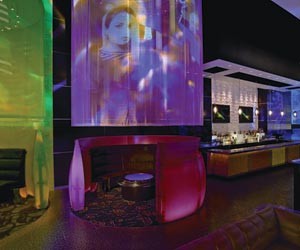Whether they’re installing futuristic boardrooms, virtual meeting suites, in-room Bluetooth entertainment centers, lobby Internet lounges or interactive cocktail bars, many hotels are upping the ante when it comes to state-of-the-art services and amenities. Technology is fast changing the typical hotel guest experience, everywhere from the meeting room to the disco floor.
Partly fueling the trend, particularly when it comes to in-room entertainment amenities, is the emergence of the so-called "lifestyle" hotels as well as the desire of guests to have the same level of technology that they have at home, observes Robert Mandelbaum, director of research information services for PKF Hospitality Research, an Atlanta-based consultancy.
"Residential trends translate into hotel trends, so it’s not surprising that entertainment options in the room are gathering steam," he says. "It’s partly generational—if I’m a big gamer at home, then I want Wii or Gameboy in the room. When it comes to the new lifestyle or select-service hotels, which often target a younger, hipper audience, one of their signatures is technology in the guest rooms."
At theWit Hotel, a new 238-room boutique property in Chicago with event space that includes a high-definition multimedia theater, "technology is a cornerstone," says Lou Carrier, chief brand officer for ECD Company, which developed the hotel. "Every piece has to integrate to create a truly unique guest experience."
Among the in-room innovations at theWit is touch-screen access to a variety of services, including valet notification, restaurant reservations, requesting towels from housekeeping, ordering wake-up calls and looking up airline flight and weather information. Guests with a sense of humor can order wake-up calls with celebrity voices provided by impressionists from Second City Chicago, including President Barack Obama, Mayor Richard Daley and Al Capone.
Another new boutique property, the 244-room Hotel Sorella in Houston, claims to be the first hotel in the U.S. to install rooms with TeleAdapt’s Media Hub HD, a panel that enables guests to enjoy customized entertainment by incorporating stereo Bluetooth technology.
Guests can wirelessly stream audio from an iPod Touch and certain smart phones such as iPhone, Palm Pre and Nokia N97 through the hotel’s flat-screen HDTV speakers without leaving the device tied to the connectivity panel. In addition, the entertainment panel gives guests the ability to transfer music, photos, videos and other multimedia content from their own electronic devices to the big screen with a single multimedia cable.
Meeting Innovations
Some of the most impressive hotel tech advances are happening not in the guest room but in the meeting room. A prime example of this are recent announcements by Starwood and Marriott of plans to unveil "telepresence suites," meeting rooms equipped with Cisco’s TelePresence technology that will enable small groups to meet remotely with other groups in similar suites.
Accommodating groups of 20 or less, the suites, available on a pay-per-use basis, will be equipped with high-definition video and real-time audio technology. Along with allowing communication between multiple hotel locations, connections can also be made with the network of Cisco TelePresence Suites that are open to the public in locations in cities that include Boston, London and Mumbai.
Marriott plans to introduce its telepresence suites starting this fall at Marriott, JW Marriott and Renaissance properties in 25 cities worldwide, including New York, San Francisco, London, Hong Kong, Shanghai and Washington, D.C. Starwood plans to have its suites up and running in 10 locations by the end of the year, including the New York Sheraton Hotel & Towers, Sheraton Centre Toronto, Westin Los Angeles Airport and W-Chicago City Center.
With corporate travel budgets down this year, the suites are likely to find a receptive audience, according to meetings technology consultant Corbin Ball, president of Corbin Ball Associates in Bellingham, Wash.
"Videoconferencing will be an increasing trend. People are looking for alternative ways of connecting, especially in times like these," he says. "Telepresence rooms are a great option for small groups. It’s a good idea."
Mandelbaum agrees, adding that more hotels are likely to install such services in order to stay competitive in a market where corporate meeting attendance is shrinking.
"This recession has been so deep—for both corporations and the lodging industry—that it has forced businesses to look at alternative meetings," he says. "At the same time, there’s a new generation that is more comfortable with technology such as videoconferencing. This will not eliminate meetings, but it is changing them to some degree.
"From the standpoint of hotels, they want to make sure that they can make money off this new way of holding meetings. We may not get all 100 people coming to the hotel, but at least we will get some of them and include the others in a virtual meeting. We can position ourselves as a destination for video-linked meetings, and so not lose out entirely."
Among hotels that have been making substantial investment in meetings communication technology is the Westin Tabor Center, a 430-room hotel in downtown Denver that recently unveiled an executive board-room outfitted with the latest in videoconferencing and audiovisual amenities. They include a high-definition video monitor, touch-screen controls, high-fidelity speakers and connectivity stations placed throughout the table that provide power for participant laptops, Internet access through a Category 3 Ethernet port and the ability to project presentations and share audio files.
According to Travis Faust, director of sales and catering, the new boardroom is proving to be a "deal closer" in attracting meetings to the hotel, with the videoconferencing capabilities opening up a new market among locally based clients.
"In the current economic conditions, people are looking for ways to get people together without traveling," he says. "Videoconferencing keeps us competitive."
Ball notes that another trend is the increasing use of electronic signage posted outside hotel meeting rooms.
"With the price of flat-panels going down, hotels are able to use electronic signage, which gives planners a lot more flexibility in that it can be linked with the scheduling system," he says. "Plus it’s much cleaner and neater than paper and easels—a greener way to go."
Lounge Links
Hotel technology is also getting innovative in public spaces, including lobbies and even cocktail lounges.
Last year, Sheraton Hotels, in partnership with Microsoft Corp., introduced Link@Sheraton in its hotel lobbies—areas with computer stations, some equipped with webcams, where guests can e-mail, search the Internet, send video postcards, view local attractions and print boarding passes. This fall, the lobby lounges, which also include televisions, daily newspapers and food-and-beverage service, are being upgraded with PCs equipped with Windows 7.
According to Hoyt Harper, senior vice president of brand management for Sheraton, the concept behind Link@Sheraton is to offer a more social environment than the traditional business center, something that many guests prefer.
"We wanted to create a destination where all of our guests could come to socialize, be entertained, people-watch or be alone but not lonely," he says.
Communication using touch-controlled technology is making the scene at hotel cocktail lounges, with resort properties in Las Vegas leading the way. At Mandalay Bay, the eyecandy sound lounge & bar, which is available for group events, is decked out with interactive touch tables enabling guests to create visuals and messages projected onto a screen above the dance floor. The dance floor itself is made of touch-activated LED tiles that create a changing visual landscape beneath the dancers’ feet.
Also in Las Vegas, the iBar lounge at Rio All-Suite Hotel & Casino is equipped with Microsoft Surface tables that enable users to communicate with people at other such tables, order customized cocktails, play games and explore a virtual Las Vegas Strip.




